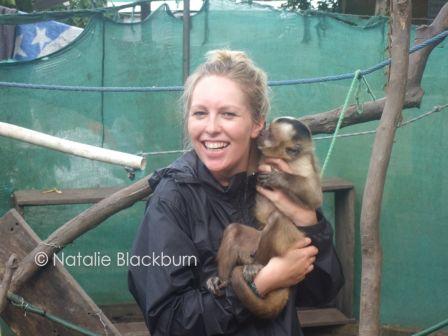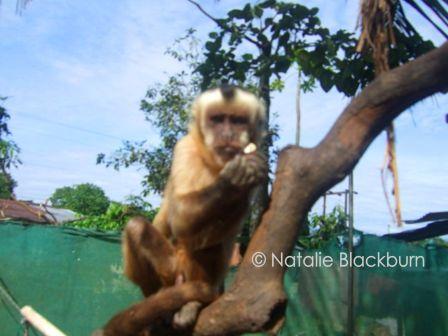|
Volunteer in Bolivia at Inti Wara Yassi My experience as a volunteer in Bolivia at Inti Wara Yassi. Natalie Blackburn, age 30, UK. Alison Donald, Editor of the BoliviaBella.com free monthly E-zine Beautiful Bolivia, interviewed Natalie regarding her Bolivia volunteer experience at this animal refuge near Cochabamba, Bolivia. Natalie shares here:
Last year I volunteered at Inti Wara Yassi (IWY) Parque Machia. Their purpose is to rehabilitate or permanently care for mistreated or abused animals and educate the Bolivian public about environmentalism. I wanted to help abused animals and give them some light and love in their lives. I also wanted to meet interesting and inspiring people.
A friend had been travelling the previous year and had met travellers who were volunteers at IWY. They had very positive reports on the organisation. To learn more, I became a member of a forum called Travellerspoint and through this, I was put into contact with a lady who unofficially managed the volunteers. I gained lots of information about the organisation through her and I felt more at ease when I arrived at the place, knowing that I had had contact with someone there. I also researched the organisation on the internet. You cannot prior arrange your placement at IWY. You simply have to turn up and then they will see if they have a requirement for you at that base. I was based at Parque Machia and IWY had another base called Ambue Ari. I actually arrived at the park at 2.30 am because of road blockages and bus delays and had to sleep on the floor in an unsecured room – needless to say, I did not sleep at all that night! Costs and living conditions I paid a fee of 1500Bs [around US$200] for 15 nights. The cost of the accommodation does vary, however. Some rooms are very basic – others slightly less so. It is compulsory that you stay a minimum of 15 nights. There were no meals included. They ran an on-site café which sold meals. I am not aware that they were making a profit out of the volunteers’ fees, however, a fee was charged to the public so that they could have a park tour to see the monkeys in the Mirador (where they were based just before they were released back in to the wild) and perhaps a few large cats and a bear. You will need to budget for food. Parque Machia is based in Villa Tunari and there are a few restaurants and shops that are comparatively overpriced because the owners are aware that there are many volunteers in the area. You do not need to budget for transport as you generally don’t venture out of Villa Tunari. The nearest big town is Cochabamba which is a few hours away. A day in the life of a volunteer at Inti Wara Yassi I worked with the Capucchin monkeys in an enclosure called “Quarantine” and I would typically start work at 7 am by either preparing their “api” (a nutritious porridge-like drink) or I would open the curtains of their cages. Our team of 8 had a rota to follow and next, I would prepare the monkeys’ breakfast which consisted of fresh fruit and then other volunteers would then feed the monkeys through the bars of their cages. The monkeys would then be let out on their ropes to run relatively free in a small space (if they were tame enough – the more aggressive monkeys had to stay in their cages) and we would begin cleaning the enclosure for around 3 hours, or we would hand – wash the blankets that they had cuddled all night and were consequently soiled. The volunteers would rota their lunches of 1 hour and by that time, you were very hungry! A lunch of vegetables would be prepared and served to the monkeys and then we would have an hour or so of playtime with monkeys which was very important for their socialisation (if they were not going back into the wild) – and of course it was great for us to get the chance to interact with them. Then, we would clean again and at around 6pm, we would put the monkeys back in their cages and give them their blankets and cover their cages for the night. Some slept alone – others had friends or mates. After an 11 – 12 hour day, you just wanted to sleep and you would wake at 6 am for it all to start again! You cannot have a day off until you have worked for 15 days, and then you get a day off every 2 weeks. Since I stayed for 15 days only, I did not get a day off. It is very hard work at IWY. You really do work near enough 12 hour days for 15 days solid, initially, and it can become exhausting. You do have to make sure you eat well during this period and rest when you can as you can become weak with all the energy you are using up. I have felt a lot of pity for the monkeys that will spend the rest of their days cooped up in a cage, but then I realise that at least they are not being physically and mentally abused any more. I have gained an insight into the ugliness of mankind and I do struggle to understand how they can abuse helpless animals. I am aware that people will sell animals and precious artefacts on the “black market” to make money as they are poor and are victims of the society we live in, at the detriment to the environment, and IWY is trying to educate these people into realising that they are contributing to the devastation of the planet, which can only be a good thing. If IWY had government funding, they would be able to educate on a wider scale.
Wild animals are wild for a reason and should not be tamed if possible. It is because of mankind that these animals have had their lives ruined and it really makes me very upset. You can see the effects of abuse upon the animals – some are extremely timid and others are very aggressive. What were your favourite things about working at IWY? My favourite things included developing a bond with certain monkeys, however, when it comes time to leave, it can be upsetting, not only for you, but for the monkey that you have become involved with. I also enjoyed meeting many new different people from all over the world, many of whom I am still in contact with now, being educated on a basic level about ecology and trying to make a difference to the animals’ lives. And your least favourite? I felt it was a constant mind struggle when I played with the monkeys, as although it was a lovely experience, I was aware that it was not natural and this could hinder their release into the wild. Indeed, it would be cruel to release a tame monkey into the wild when they were so used to human interaction – they would not be able to fend for themselves and consequently survive - so the tamer monkeys may never get released into the wild which is very sad. On the whole, you clearly enjoyed your time at Inti Wari Yassi. Did other volunteers feel the same? Generally, I think that the volunteers enjoyed their time at the sanctuary, and they felt that they had a made a difference. However, I was aware that some volunteers left before their scheduled time due to their dissatisfaction with internal conflicts and power struggles that arose with other volunteers and other permanent members of staff. In any organisation, there will be disagreements between staff and this organisation was no different. The disagreements between volunteers made the experience for me less enjoyable. I think that cultivating a happier working environment to keep up the morale during long, hard days is recommended. It is not expected that all volunteers would get on with each other all of the time, but sometimes, the negative attitude of some of the volunteers and permanent workers can be catching, and if this is not rectified, it can deter volunteers going forward. It is expected that there would be a certain degree of sombreness due to the very reason why volunteers are actually needed, but I feel it is vital that spirits are kept up, as a happier work environment is a more productive one. I would also recommend having some sort of booking system so that the workers are aware when volunteers will be arriving as I did not arrive in good circumstances and I was actually quite scared. I would certainly recommend IWY to other volunteers. I think the cause is very valid and the organisation is definitely required. There is so much devastation on the planet and it is great that the organisation is helping to bring this to the forefront of the minds of the Bolivian people and to the volunteers. There are so many needy and abused animals out there that it is necessary for some intervention. Is there anything that potential volunteers should be aware of? I would warn potential volunteers that you will see the effects of abuse on animals, and it will be upsetting, but you have to try to overcome these feelings so that you are able to help them. No specific skills were needed, but, it would have been useful to at least have a grasp of intermediate Spanish to communicate with the Bolivian workers, however, most of the workers and volunteers communicated in English. I did feel that the role was quite a dangerous one in terms of the close proximity you would have with some of the monkeys who had very sharp teeth and an aversion to humans. I did see some volunteers come away with bites, scratches and deep scars. Luckily, the worst that happened to me was a few scratches and a bit of hair pulling. I did wear a jacket with a hood up pretty much all of the time I was working as I was very scared of any potential scars. You are warned to keep your distance from some of the monkeys and you should take heed of this warning. There is a qualified vet on site so you are able to visit him with minor cuts. There is also a good hospital nearby that can treat you for more serious injuries. If you do not have a full briefing on the personalities of the monkeys, then you can put yourself in danger. In summary I felt like I was doing something useful. I am an animal lover and I like to think that I made at least one monkey’s life happier – even just for one day – whilst I was there. I would certainly recommend IWY to other volunteers. I think the cause is very valid, the permanent workers and volunteers are dedicated to the cause and the organisation is definitely required. There is so much devastation on the planet and it is great that the organisation is helping to bring this to the forefront of the minds of the Bolivian people and to the volunteers. There are so many needy and abused animals out there that it is necessary for some intervention. It is just a shame that funds are extremely low and that some of the cages that the animals live in are very shabby and there is a dire lack of interesting objects to keep the monkeys occupied.     |

